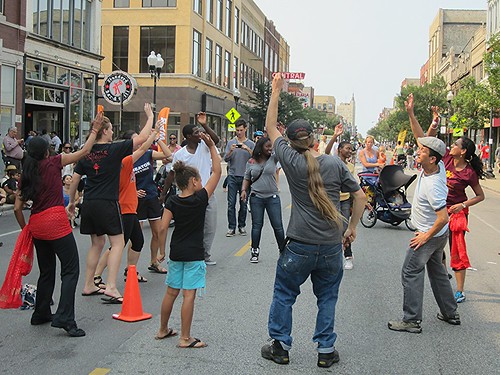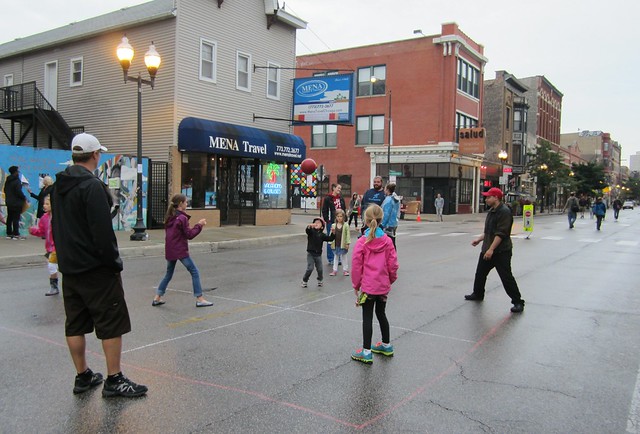It pains me to report there probably won’t be an Open Streets event in Chicago this year. Since 2005, the Active Transportation Alliance has been lobbying the city of Chicago to stage a ciclovía, a Latin American-style car-free event, in which the streets are opened for walking, biking, and other forms of healthy recreation. Various city departments declined to help organize and raise funds for Open Streets (originally called Sunday Parkways), so Active Trans did the work themselves, raising hundreds of thousands of dollars over the years to hold a number of events between 2008 and 2013. Much of the money was used for paying for the police officers and traffic control aides required by the city.
In 2012, for example, Active Trans staged two Open Streets in the Loop and on Milwaukee Avenue in Wicker Park, at a cost of between $100,000 and $150,000 each. The ciclovías were bankrolled with major donations from the Chicago Loop Alliance and the Wicker Park-Bucktown Special Service Area, plus additional funding from The Illinois Center for Broadcasting, Walgreens, REI and PNC Bank. Both were joyful affairs, with thousands of Chicagoans of all stripes coming out to stroll, jog, pedal, play, dance and relax on the car-free streets.
Last year the CLA got a new executive director and offered Active Trans a much smaller donation, so the downtown event was canceled, but the Milwaukee event was expanded from a 1.4-mile route to a 2.6-mile route, which also included Logan Square. The event was paid for mostly by the local SSA and sponsors Aldi, Walgreens, and Revolution Brewing.
For the first time in the history of Chicago’s ciclovías, thanks to lobbying efforts by then-transportation commissioner Gabe Klein and his deputy Scott Kubly, the city paid for police and traffic control, at a cost of roughly $25,000. Active Trans spent about $75,000 of its own money on the event, including part of the salary for its Open Streets manager, Julia Kim.
Unfortunately, it poured down rain much of that Saturday, so most of the activities were canceled and a relatively small number of diehards showed up to participate. This underscored the importance of staging multiple Open Streets events per year, as is done in peer cities like New York, San Francisco, L.A., and Portland, Oregon, so as not to put all of one’s eggs in a single basket. After this expensive disappointment, and a lack of sufficient funding for ciclovías this year, it’s understandable that Active Trans decided to cut its losses.
“We’re not planning to do Open Streets in 2014, but if some dependable revenue source emerges to do at least a couple of events, we will certainly do whatever we can to help out,” said executive director Ron Burke. He added that for a Chicago ciclovía to succeeds, there needs to be several events per year so that people become accustomed to them and learn to take advantage of the opportunity to play in the street. “We remain hopeful that a donor or the city will be able to provide sufficient funding to do a true Open Streets event on multiple days on a significantly long route.”
Kim, who was in charge of recruiting sponsors and organizing the events, left Active Trans in November, after helping to put on the nonprofit’s awards reception. “I like Julia a lot and she did really good work with us,” Burke said. “We’re looking for ways to work with her in the future.”
It’s tempting to blame the demise of Chicago’s ciclovía on a lack of support from City Hall, which has generally been less involved in Open Streets than has been the case with the local governments in other bike-friendly cities, but Kim declined to do so. “The city [of Chicago] has been behind it, but they have budget issues like everyone else,” she said. "It was super helpful last year for them to pay for police and traffic management."
"With 2014, it really came down to funding,” she added. “A regional nonprofit like Active Trans really doesn’t have the resources to support a big event like Open Streets on an annual basis."
Kim said that for Open Streets to flourish in Chicago, an organization with deep pockets needs to come forward with a proposal to stage multiple events over several years. She mentioned Shinola, a Detroit-based company that manufactures city bikes and other products, as an ideal candidate. Although she wouldn’t say what her current career plans are, she said she’ll continue to keep her eyes peeled for potential ciclovía sponsors. “That will always be in the back of my mind.”






